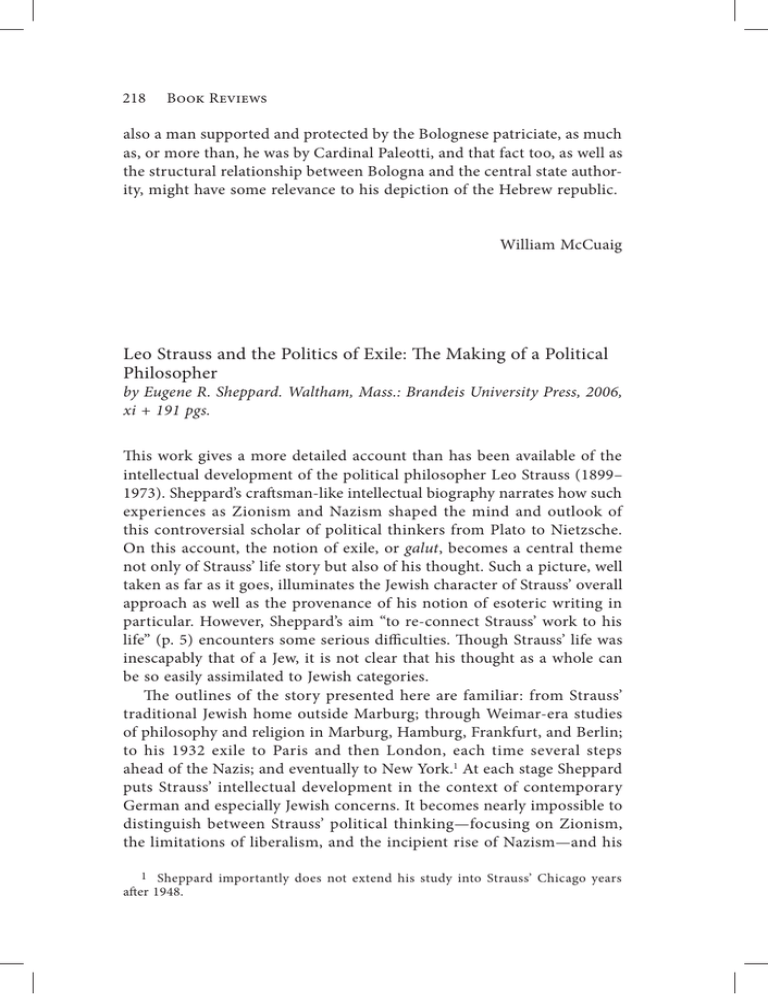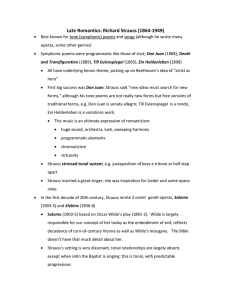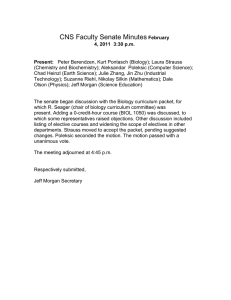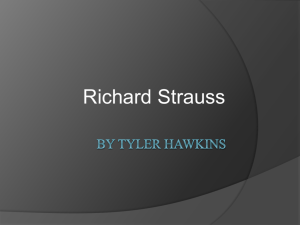218 Book Reviews
advertisement

218 Book Reviews also a man supported and protected by the Bolognese patriciate, as much as, or more than, he was by Cardinal Paleotti, and that fact too, as well as the structural relationship between Bologna and the central state authority, might have some relevance to his depiction of the Hebrew republic. William McCuaig Leo Strauss and the Politics of Exile: The Making of a Political Philosopher by Eugene R. Sheppard. Waltham, Mass.: Brandeis University Press, 2006, xi + 191 pgs. This work gives a more detailed account than has been available of the intellectual development of the political philosopher Leo Strauss (1899– 1973). Sheppard’s craftsman-like intellectual biography narrates how such experiences as Zionism and Nazism shaped the mind and outlook of this controversial scholar of political thinkers from Plato to Nietzsche. On this account, the notion of exile, or galut, becomes a central theme not only of Strauss’ life story but also of his thought. Such a picture, well taken as far as it goes, illuminates the Jewish character of Strauss’ overall approach as well as the provenance of his notion of esoteric writing in particular. However, Sheppard’s aim “to re-connect Strauss’ work to his life” (p. 5) encounters some serious difficulties. Though Strauss’ life was inescapably that of a Jew, it is not clear that his thought as a whole can be so easily assimilated to Jewish categories. The outlines of the story presented here are familiar: from Strauss’ traditional Jewish home outside Marburg; through Weimar-era studies of philosophy and religion in Marburg, Hamburg, Frankfurt, and Berlin; to his 1932 exile to Paris and then London, each time several steps ahead of the Nazis; and eventually to New York. At each stage Sheppard puts Strauss’ intellectual development in the context of contemporary German and especially Jewish concerns. It becomes nearly impossible to distinguish between Strauss’ political thinking—focusing on Zionism, the limitations of liberalism, and the incipient rise of Nazism—and his Sheppard importantly does not extend his study into Strauss’ Chicago years after 1948. Hebraic Political Studies 219 intellectual horizon, dominated by figures such as Rosenzweig, Heidegger, and Schmitt. This is not a vicious confusion. The entangled nexus of religion, philosophy, and politics emerges as Strauss’ occasion for wissenschaftlich historical research, which is simultaneously meditation on pressing contemporary problems. Though the ostensible subject may be Moses Mendelssohn and his nemesis F.H. Jacobi, or Moses Maimonides and his nemesis Spinoza, a burning, underlying issue remains: what is it to be a Jew who can neither assimilate into a Germany that won’t have him nor “return” to a simple loyalty to his people in a political, cultural, or religious sense? Much of what Sheppard reports can be found in readily available sources, but much also cannot. The new material includes the background of political anti-Semitism in rural Hesse, the memory of which may have predisposed Strauss to a less sanguine view of Jewish assimilation than that of others of more urban extraction. It also includes the behind-thescenes tensions between Strauss and Julius Guttmann, his director at the Berlin Akademie für die Wissenschaft des Judentums; Strauss’ possible attendance at the famous 1929 Cassirer-Heidegger debate at Davos; and the allegation that Strauss was later denied an appointment at the Hebrew University—where his friend Gershom Scholem was already ensconced— for appearing too much of an atheist. In the one juicy sortie into Strauss’ romantic life, it is suggested that the animus between him and Hannah Arendt may have been due not only to opposed intellectual proclivities but also to her alleged spurning of his courtship. Sheppard’s narrative is “neither an indictment of nor an apology for” Strauss (p. 5). Such have been recent discussions of Strauss that this is unto itself a contribution. In addition, Sheppard presents a thoughtprovoking, though to me unpersuasive, thesis. According to Sheppard’s account, Strauss’ intensive meditations on his own personal experiences brought him to see exile—not only in the traditional Jewish sense, but understood more generally as alienation, subordination, being “not at home” and thus caught in contradictions and dangers—as the condition not only of German Jews, or of all Jews, but indeed of mankind in general and especially the philosophers within it. Alienated first from his practicing Jewish home (whose religion he felt he could not defend) and then from a purely political Zionism that seemed marred by spiritual shallowness, Strauss later saw his work in Berlin censored by the reigning historicism, fled as a Jew before the rise of Nazism, and eventually found The impact of Karl Barth is emphasized in a recent study which is explicitly indebted to Sheppard’s. Samuel Moyn, “From Experience to Law: Leo Strauss and the Weimar Crisis of the Philosophy of Religion,” History of European Ideas 33 (2007), pp. 174–194. Moyn’s work is also cited by Sheppard. 220 Book Reviews himself an iconoclastic conservative in the liberal-radical culture of the American academy. Sheppard’s Strauss could easily have paraphrased the remark on triple foreignness attributed to Gustav Mahler: “In liberal America, I am a German conservative; in Germany, a Jew; and everywhere, a philosopher.” If I understand Sheppard correctly, he draws from Strauss’ notion of exile a clue to the current relevance of Strauss’ thought. The twentieth century saw various messianic movements’ attempting to bring an end to the contradictions of human life. It also saw the seeming victory of liberalism, arguably the most skeptical, least fervid of the contenders. For a moment, it seemed that the fever of the 1914–1989 period had finally passed and that a more relaxed, skeptical, and ironic age could begin. The impact of Islamic terrorism has not fundamentally put an end to these gentler tendencies and so far has not re-created in the West the tensions and expectations of the short twentieth century. But the special mood that arose in the wake of high modernism has shifted and now seems less permanent or inevitable, having lost its character as a secure “home.” The hope of being relieved of redemptive fervor has thus emerged as one more false redemption. Even the rejection of political messianism has been deprived of its sotto voce messianic import. It may be this mood that makes Strauss especially relevant now. Once it appears that no redemption is imminent and that we must make the best of a situation that is inherently limited and contradictory, Strauss’ thoughts about how to find our bearings in such circumstances seem all the more pertinent. For Sheppard, “Strauss neither romanticized powerlessness and alienation nor castigated such conditions to be wholly abject and contemptible” (p. 7). “Acknowledging exile as a starting point means keeping in mind how unjust and imperfect current political orders are when compared to the very principles and ideals of those states…. Acknowledgment of exile carries with it a heightened concern for the fragility of human life under stressed and impoverished conditions” (p. 130). For Sheppard, Strauss’ legacy seems to be a vision of politics that neither denies the absence of redemption in the world nor becomes despondent at or paralyzed by the thought that we cannot change this fact. Perhaps the biggest piece missing from Sheppard’s picture is Strauss’ engagement with Greek philosophy. Had Sheppard extended his study into Strauss’ mature years in Chicago, he would have needed to confront a question already relevant in Strauss’ youth: did Strauss ever find a home of sorts in the political philosophy of classical Athens, or at least These movements were dubbed “political religions” or “ersatz religions” by Strauss’ friend and correspondent Eric Voegelin. See the latter’s lectures and essays collected in Modernity Without Restraint (Columbia, Mo.: University of Missouri Press, 2000). Hebraic Political Studies 221 in its city “in heaven”? (cf. Plato, Republic 592b). Sheppard would also have had to confront the ways in which the persecution threatening the philosopher—who, as such, questions society’s convictions—is decisively different from that threatening the Jews. As a matter of biography, both senses of the term “exile” may have coincided in Strauss’ own life experience, but only the former is a candidate for grounding in the nature of man and is thus a theme of philosophical concern. To be fair, it is Strauss himself who conflates the imperfect character of human society and the exile of the Jewish people: “The Jewish problem is the most manifest symbol of the human problem insofar as it is a social and political problem.” But it takes no obscure canon of interpretation to note the last phrase. Insofar as the human problem is intellectual, and not just social and political, the galut need not point to anything fundamental. By contrast, the peculiar situation of a Socrates, who is wise in knowing that he knows nothing, though it may involve alienation from and condemnation by the Athens in which he lives, also includes much wonder, the pleasures of conversation, and, in a word, philo-sophia, the love of wisdom. This form of life—Socrates famously preferred to die in Athens than to live in exile—seems to have been at least as important for Strauss as any role he may be said to have played as an interpreter of Jewish experience. Regretfully, I must note that the transition of this work from dissertation to book has not been smooth. The entire text is in need of proofreading, especially the German quotations. The notes, and particularly the abbreviations of references, suffer from inconsistencies and redundancies as well as a few omissions and errors. Sometimes it is not even clear which of these problems is in evidence (e.g., p. 177 n. 9). To what degree the fault lies with Brandeis University Press or with the author is unclear. In sum, Sheppard’s work furthers the fuller assessment of Leo Strauss by illuminating well those aspects of his life and thought that are social and political and thus readily symbolized by the Jewish exile. Joshua I. Weinstein, The Shalem Center Leo Strauss, “Preface to Spinoza’s Critique of Religion,” in Strauss, Liberalism Ancient and Modern (Chicago: University of Chicago Press, 1995), p. 230.



